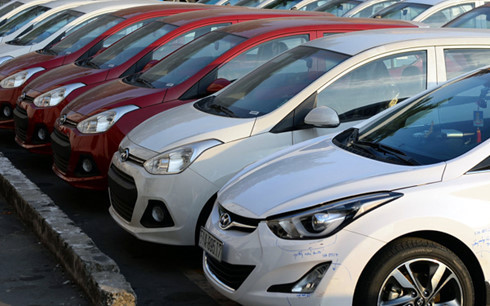Many Japanese car manufacturers are about to leave Vietnam?
The chief representative of JETRO said that Japanese automobile companies may close or reduce their car assembly production in Vietnam.
The chief representative of the Japan External Trade Organization (JETRO) in Ho Chi Minh City has confirmed that many Japanese automakers may withdraw from Vietnam. “Japanese companies investing in the automobile manufacturing industry may close or reduce their automobile assembly production in Vietnam,” said Takimoto Koji, chief representative of JETRO in Ho Chi Minh City.
Currently, Japan has 4 car manufacturers in Vietnam: Honda, Toyota, Suzuki and Mazda, but Jetro representative has not revealed which company will leave Vietnam...
 |
| Cheap imported cars from ASEAN and India are posing a big challenge to the domestic auto manufacturing industry. |
Cars from India cost only about 84 million VND
According to the latest data from the General Department of Customs, on average, in January 2017, each car imported to Vietnam had a price of only about 20,800 USD/car (excluding tax), while the average price of imported cars in January 2016 was 25,300 USD/car.
Of which, imported cars from India have the lowest price, averaging only about 3,700 USD (equivalent to about 84 million VND/car, excluding tax); imported cars from Indonesia have an average price of only about 440 million VND...
Notably, the growth rate of imports from ASEAN is very strong, especially cars from Thailand and Indonesia. In particular, car imports from Indonesia increased dramatically, reaching 1,823 units, while in the same period last year there was only... 1 unit.
For non-ASEAN markets, car imports from India recorded a sharp increase of 1,006 units.
Currently, many car showrooms are quite busy with customers coming to see and ask to buy cars priced under 500 million VND. Mr. Thanh Chung, residing in District 7, Ho Chi Minh City, stated the reason for preferring imported cars because he believes that although they are the same car model, cars manufactured in Thailand feel much smoother when running than new cars manufactured in Vietnam.
"Maybe the car standards in Vietnam are lower so the price is cheaper, many accessories are only equipped in imported cars," said Mr. Chung.
Mr. Nguyen Duc Toan (Hoang Mai, Hanoi) said he was looking for a car from Indonesia because he now needs a car to travel safely. With a budget of less than 400 million VND, he plans to buy a car from ASEAN instead of buying some Korean models that are "familiar" as cheap.
The trend of importing instead of producing
According to the assessment of JETRO representative, according to some experts and people with many years of experience in the auto business, it is understandable that FDI auto manufacturing and assembly enterprises will leave Vietnam, if it happens.
Because Vietnam keeps giving incentives, while there is not enough pressure, so after enjoying the incentives, when imports are more effective, they will stop production and start importing, and cannot "do charity".
According to Mr. Le Nguyen Minh Tuan - Sales Director of Saigon Ford Pho Quang (HCMC), taxes have gradually decreased and from January 1, 2017, small capacity cars with less than 9 seats imported from ASEAN will have their taxes reduced by 10% (to only 30%), so car companies maintain two independent business segments: assembly and import for sale.
When Vietnam's auto tax rate is reduced, helping to reduce car prices by hundreds of millions of dong per car, Mr. Tuan believes that manufacturers will switch to imports, gradually narrowing down production.
The owner of a car showroom on Le Van Luong extended street (Hanoi) also said that through importing goods, he realized that the strong tax reduction has caused many car manufacturers to switch to importing complete units instead of manufacturing and assembling in Vietnam. The manufacturers only assemble cars with small capacity of 1.5L, the rest are mostly imported from Thailand./.
According to VOV
| RELATED NEWS |
|---|

